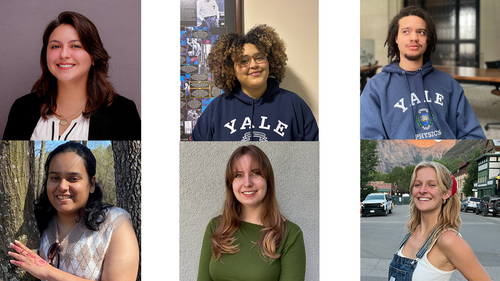
Yale Physics graduate students Jackie Baeza-Rubio*, Eunice Beato*, Halona Dantes, Avery Hanna+, Cecily Lowe*; undergraduate student Aaron Chizhik ‘25* and undergraduate alum Laura Zhou ‘22* (now at Stanford University) were each awarded the 2025 National Science Foundation Graduate Research Fellowship (NSF GRFP). Graduate student Morgan Cole* received an honorable mention.
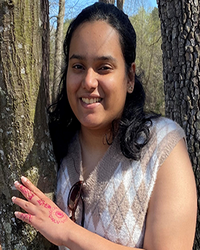 Halona Dantes is a third year graduate student in Alison Sweeney’s lab group. Dantes commented, “My journey of scientific research began in the summer of my sophomore year at a REU program at UIUC where I was advised by Professor Zaida Luthey-Schulten. This is where I realized how powerful scientific research and learning can be in not only solving problems but also asking the right questions. My diverse experiences at my undergraduate institutions, Fayetteville Technical Community College and University of North Carolina at Chapel Hill, helped me realize that the most fulfilling aspects of Physics for me are those intricately intertwined with living systems and led me to Yale where I joined Alison’s group. My research entails characterizing hyperuniformity in optically fascinating living systems such as the squid lens using experimental techniques such as light scattering.”
Halona Dantes is a third year graduate student in Alison Sweeney’s lab group. Dantes commented, “My journey of scientific research began in the summer of my sophomore year at a REU program at UIUC where I was advised by Professor Zaida Luthey-Schulten. This is where I realized how powerful scientific research and learning can be in not only solving problems but also asking the right questions. My diverse experiences at my undergraduate institutions, Fayetteville Technical Community College and University of North Carolina at Chapel Hill, helped me realize that the most fulfilling aspects of Physics for me are those intricately intertwined with living systems and led me to Yale where I joined Alison’s group. My research entails characterizing hyperuniformity in optically fascinating living systems such as the squid lens using experimental techniques such as light scattering.”
About winning an NSF GRFP award, Dantes said, “I am honored to have won the NSF GRFP and I am grateful to both my undergraduate and graduate professors and advisors for supporting my scientific research journey.”
Sweeney said, “Halona has exhibited grit and integrity at every point on her path to becoming a physicist. I can’t think of a more deserving candidate for this award. I’m particularly proud that she‘s a new American and welcome her to the GRFP club! I’m very excited and privileged to watch the rest of her career unfold. Congrats, Halona!”
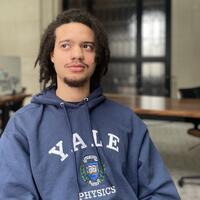 Aaron Chizhik ‘25 is a physics and music (piano) major, working with Karsten Heeger, Eugene Higgins Professor and Chair of Physics, director of Yale’s Wright Lab, and Chizhik’s advisor; and Reina Maruyama, professor of physics at Wright Lab, on the CUORE/CUPID collaborations searching for evidence of neutrinoless double beta decay. His research has focused on hardware characterization and development for next-generation detectors. He has been an active member of Yale’s Society of Physics Students (SPS), serving as Prize Lecture Chair and later as Co-President from Spring 2024 through Fall 2024.
Aaron Chizhik ‘25 is a physics and music (piano) major, working with Karsten Heeger, Eugene Higgins Professor and Chair of Physics, director of Yale’s Wright Lab, and Chizhik’s advisor; and Reina Maruyama, professor of physics at Wright Lab, on the CUORE/CUPID collaborations searching for evidence of neutrinoless double beta decay. His research has focused on hardware characterization and development for next-generation detectors. He has been an active member of Yale’s Society of Physics Students (SPS), serving as Prize Lecture Chair and later as Co-President from Spring 2024 through Fall 2024.
Chizhik said he is “honored to be offered the NSF GRFP, and is excited to continue his engagement with the larger physics community at UC Berkeley,” where he will begin his Ph.D. in physics in Fall 2025.
Heeger said, “Congratulations to Aaron for winning the NSF graduate fellowship! This is a wonderful recognition and continuation of the work he started at Wright Lab. Over the past year, he worked on the development of instrumentation to reduce backgrounds in the CUORE and CUPID neutrino experiments. His proposal to develop new quantum sensors will help decipher if neutrinos are their own antiparticles and probe the nature of dark matter.”
Maruyama added, ”Aaron’s proposal on finding neutrinoless double beta decay is inspired and forward-looking. I wish him well as he embarks on the next chapter of his studies at Berkeley.”
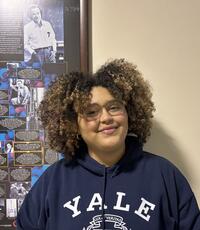 Eunice Beato is a second-year Ph.D. graduate student working in the Maruyama group at Wright Lab on the various axion dark matter searches. Beato graduated from Wellesley College with a B.A. in physics.
Eunice Beato is a second-year Ph.D. graduate student working in the Maruyama group at Wright Lab on the various axion dark matter searches. Beato graduated from Wellesley College with a B.A. in physics.
Beato explained, “During the summer of my junior year at Wellesley I was awarded the opportunity to conduct axion dark matter research with Professor Lindley Winslow at MIT. That summer I was introduced to a whole new side of dark matter candidates, axions, that I had not heard of before and thus my passion for axion dark matter searches developed. “
Beato continued, “After graduating from Wellesley and spending the summer working at Fermilab with neutrinos, I was delighted to come to Yale and start working on axion dark matter again in Reina’s Lab. Now I have been integral to developing the DAQ system for the ALPHA experiment and simulating the cavities for the RAY experiment.”
Maruyama said ”Eunice wrote a fabulous application on finding axions! I am so proud of her and her work, and we all look forward to working with her. Congratulations!”
Maruyama also offered her well-wishes for Zhou, who she advised during Zhou’s time at Wright Lab, saying, “Congratulations to Laura! The award is well-deserved and I wish her well as she continues her studies at Stanford.”

 Cecily Lowe is also a second-year Ph.D. graduate student working in the Moore Lab, developing a novel method to directly detect dark matter using an array of levitated optomechanical sensors. These sensors are sensitive to small momentum transfers from scattering dark matter particles, allowing us to probe mechanisms for dark matter interaction with normal matter in regions of the mass parameter space unexplored by traditional detector technologies. An array of these sensors enables rejection of correlated noise sources and increases sensitivity to interactions that may be too rare to detect with a single sensor. Lowe’s current work focuses on achieving electrical and thermal isolation to enhance the sensitivity required for a dark matter search.
Cecily Lowe is also a second-year Ph.D. graduate student working in the Moore Lab, developing a novel method to directly detect dark matter using an array of levitated optomechanical sensors. These sensors are sensitive to small momentum transfers from scattering dark matter particles, allowing us to probe mechanisms for dark matter interaction with normal matter in regions of the mass parameter space unexplored by traditional detector technologies. An array of these sensors enables rejection of correlated noise sources and increases sensitivity to interactions that may be too rare to detect with a single sensor. Lowe’s current work focuses on achieving electrical and thermal isolation to enhance the sensitivity required for a dark matter search.
Moore said, “We are really excited that Jackie and Cecily were awarded GRFP fellowships this year to support their graduate work! These awards recognize not only their impressive accomplishments already to date, but also the very exciting work they are proposing in the next few years. Both of their proposals are extremely innovative and will develop new technologies that may help us get our first hints of dark matter scattering in the lab, or measure new properties of neutrinos.”
Moore continued, “Usually experiments searching for neutrinos and dark matter require large detectors located in underground facilities, but I think it’s especially exciting that the work Jackie and Cecily are proposing can let us search for new physics in tabletop scale experiments located at Wright Lab.”
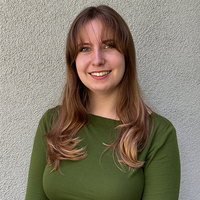 Avery Hanna recently graduated from Tufts University with a B.S. in Engineering Physics and is starting her Physics Ph.D. at Yale this fall. She has worked in machine learning for particle physics at CERN and SLAC as well as conducted research in quantum materials. She is excited to dive deeper into experimental particle physics in her Ph.D. and is interested in how quantum technology can advance the field. Beyond her research, Avery is an advocate for increasing educational equity in STEM which she has pursued as a tutor for incarcerated students with the Petey Greene Program and as a board member of Tufts Gender Diversity in Physics.
Avery Hanna recently graduated from Tufts University with a B.S. in Engineering Physics and is starting her Physics Ph.D. at Yale this fall. She has worked in machine learning for particle physics at CERN and SLAC as well as conducted research in quantum materials. She is excited to dive deeper into experimental particle physics in her Ph.D. and is interested in how quantum technology can advance the field. Beyond her research, Avery is an advocate for increasing educational equity in STEM which she has pursued as a tutor for incarcerated students with the Petey Greene Program and as a board member of Tufts Gender Diversity in Physics.
Hanna commented, “Receiving an honorable mention in the spring was on its own super exciting as it gave me a much needed boost of confidence that I can succeed as a physicist and make valuable contributions to the field. So getting the recent news that they are able to offer me a fellowship after all was just amazing. Having the support of the NSF throughout my Ph.D. will be incredibly valuable in allowing me to pursue my research goals.”
According to Baeza-Rubio, “while they usually award 2,300 students [per year]; this year, due to budget cuts, only 1,000 were awarded in April 2025.”
Baeza-Rubio continued saying, “In June, another round of awardees have been announced with an additional 500 awards and total of 1,500 winners. This is less than the usual number, so competition was particularly fierce this year.”
The purpose of the NSF GRFP is to help ensure the quality, vitality, and diversity of the scientific and engineering workforce of the United States. The program recognizes and supports outstanding graduate students who are pursuing full-time research-based master’s and doctoral degrees in science, technology, engineering, and mathematics (STEM) or in STEM education. The five-year fellowship includes three years of financial support including an annual stipend of $37,000. Click here for a list of awardees.
*Member of Wright Lab
+Incoming graduate student
This article has been updated from an article published on April 10, 2025, to reflect the additional awardees from Yale Physics in the June announcement.